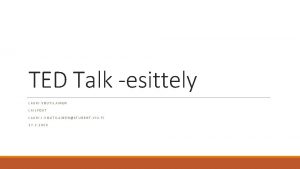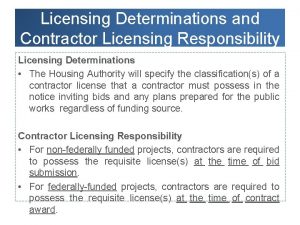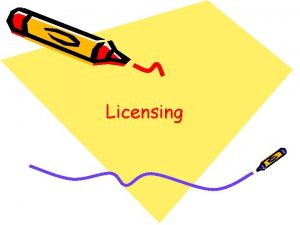Extended Collective Licensing Warsaw 17 March 2016 Lauri









- Slides: 9

Extended Collective Licensing Warsaw, , 17 March 2016 Lauri Rechardt , Director, Licensing & Legal Policy IFPI 1

Licensing of rights for digital services Artist concludes a contract with the a record company, records her performance, transfers her rights to the company, and company agrees to pay royalties Authors’ rights are licensed by collecting societies or publishers directly The record company concludes agreements with users, for the artists rights they have acquired and for their own rights Digital services obtain both performers’ and record companies’ rights 2

Record companies have worked hard to make music available online to new consumers… The recording industry has done a tremendous job in enabling hundreds of digital services and providing access to over 43 million recordings 3

… which has enabled strong growth in digital, and streaming revenue in particular… 30, 000 25, 000 Physical Permanent downloads Streaming (Subscription + Ad-Supported) Performance Rights Synchronisation Other 20, 000 15, 000 10, 000 USD millions 5, 000 2001 2002 2003 2004 2005 2006 2007 2008 2009 2010 2011 2012 2013 2014 The Global Trend • In 2004 digital services accounted for 2 % of industry revenue. • By 2014 the share of digital services had increased to 46 % of total industry revenue. • Physical and download sales are declining, streaming is growing Source: IFPI. In USD millions at 2013 fixed exchange rates

Characteristics of the recorded music market • Transformations from physical to digital, and from ownership to access • Revenues from digital services surpassed revenue from physical sales • Any distinction between primary and secondary markets disappearing; everything is consumption, there are no longer “secondary uses”. • Revenues dispersed over several sources from vinyl sales to streaming and synchronization licensing. 5

Role of ECL • ECL is primarily a way to “mop up marginal rights” in order to provide legal certainty to users and make already effective and representative collective licensing even more effective. • ECL can be justified in certain circumstances, but its limitations should be acknowledged – It is a limitation subject to three-step-test (in TRIPs, WPPT, etc) – it may not be applied indiscriminately or with respect to rights and uses that can be licensed by right holders individually (i. e. licensing of most digital uses and services). – It should not be used against industry practice. Governments should not regulate against the markets, but seek to create fair market conditions and a level playing field. – ECL is an enabling tool, but the need to level the markets becoming pressing • ECL combined with unrepresentative or poor quality collective management is a toxic mix. 6

Use of ECL in the recorded music sector • Which of the performers’ and producers’ rights are licensed collectively? – Broadcasting (including satellite and cable) & public performance (= Art 12 RC / Art 15 WPPT). – Dubbing (reproduction for the above purposes). – [Private copying levies]. – Certain on-line uses, but as a rule NOT interactive services (streams or downloads) or distribution of sound recordings. – Note, record industry CMOs (MLCs) offer already, on voluntary basis, multi-territory, multi-repertoire licenses for simulcasting, webcasting, catch up services, and for background music on websites. • ECL may be helpful to further strengthen the licensing of broadcasting and public performance licensing, but not strictly speaking necessary • Prima facie, ECL has no application for online rights or uses 7

ECL – key questions • How to reconcile ECL with article 5 of the CRM directive – Right holders should be free to determine when, where, and by whom their rights are licensed collectively. • How to reconcile national ECL provisions with the policy objective to create a digital single market – In particular when right holders have already mandated a CMO to license their rights cross borders, or where individual right holders have licensed a cross border service • ECL encroaches upon individual exclusive rights. How to ensure compliance with international treaties? 8

Thank you! Please contact: www. ifpi. org Lauri. Rechardt@ifpi. org 9

















